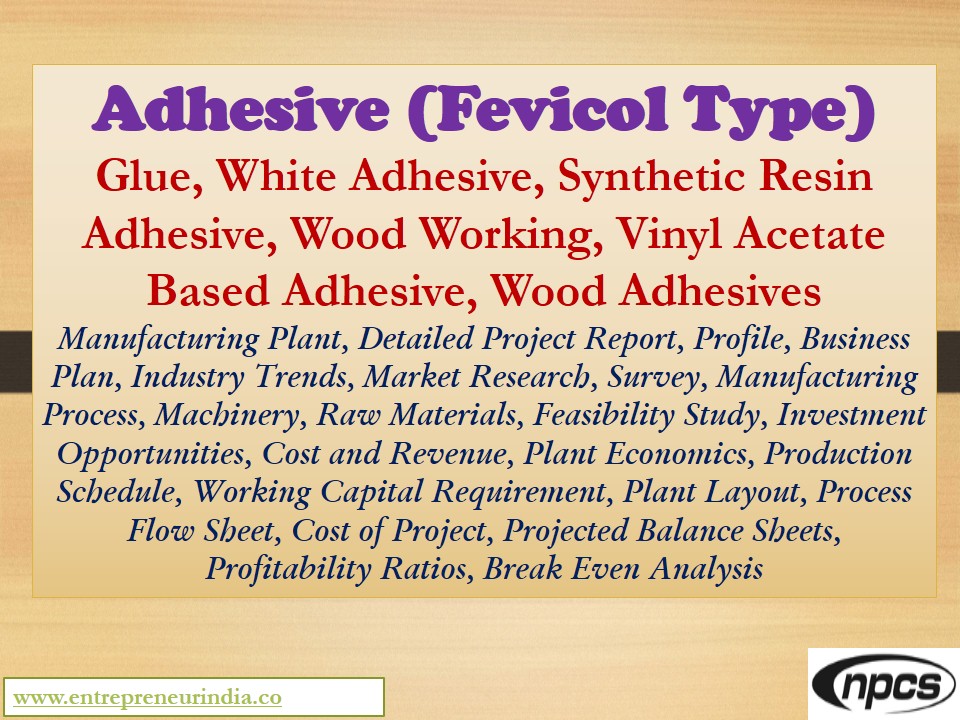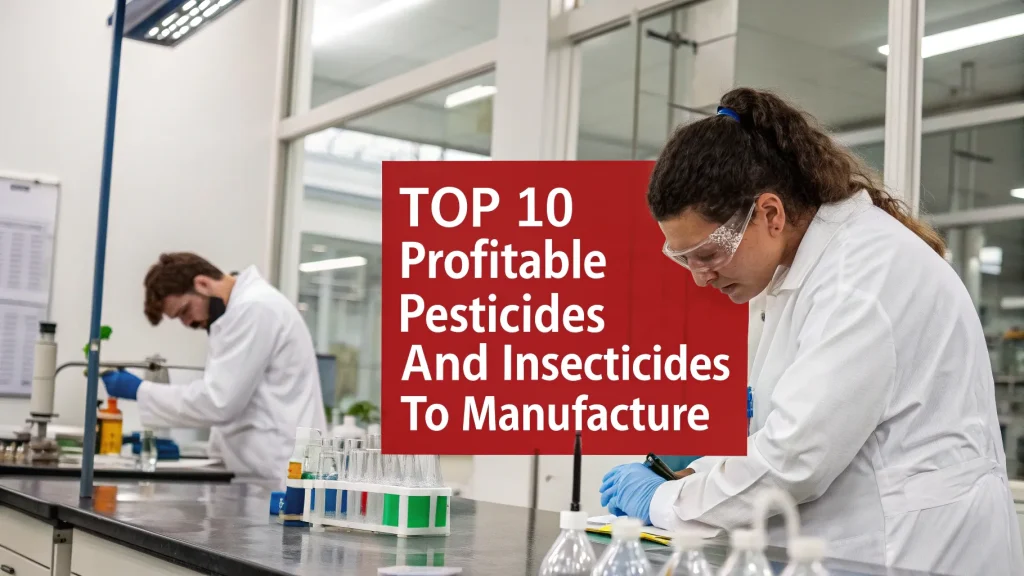
The manufacturing of Fevicol Type Adhesive Manufacturing Plant has been regard as a lucrative business idea due to the growing demand for white glue in construction, carpentry, packaging, and household applications. Known for its versatility and strong bonding capabilities, Fevicol-type adhesive is essentially a synthetic resin-based white glue primarily compose of polyvinyl acetate (PVA). Over the years, the industry has witness significant expansion, largely driven by increase usage in furniture, handicraft, and paper industries.
Furthermore, the rising demand for ready-to-use bonding agents and water-based adhesives has made this manufacturing segment highly viable for startups and small-scale industries. With relatively low capital investment, simplified processing, and easy availability of raw materials, this industry offers a promising opportunity to generate high returns.
Project Overview and Market Potential
A Fevicol-type adhesive plant can be set up in a medium-sized industrial unit with moderate capital. The product is in use across various end-use sectors, including woodworking, textile finishing, laminates, bookbinding, packaging, arts and crafts, and school applications. Moreover, apart from the domestic market, significant export scope is seen in regions where synthetic adhesives are in demand for eco-friendly and durable performance.
See Also : detergent manufacturing business
Given the shift towards non-toxic, water-based adhesives, more opportunities have been unlocked for entrepreneurs planning to enter this market. In recent years, environmental regulations and bans on solvent-based adhesives have further fueled the demand for white PVA-based glue.
Raw Materials Used in White Glue Manufacturing
To manufacture white glue, easily available and cost-effective raw materials are employed. Chief among these is polyvinyl acetate, which serves as the core polymer responsible for adhesion.
Other essential raw materials include:
-
Vinyl acetate monomer (VAM) – polymerized to produce PVA.
-
Plasticizers – used to improve flexibility.
-
Thickeners and stabilizers – such as carboxymethyl cellulose (CMC).
-
Preservatives – added to prevent microbial growth.
-
Defoamers and emulsifiers – to stabilize the formulation.
-
Water – used as the dispersion medium.
All of these materials are relatively affordable and can be sourced from domestic chemical suppliers or imported depending on quality requirements. Importantly, the manufacturing process is water-based, and thus it is considered environmentally friendly and suitable for small and medium-scale entrepreneurs.
Fevicol Type Adhesive Manufacturing Process
The adhesive is produced through emulsion polymerization in a reactor vessel. This controlled process ensures a stable colloidal dispersion of PVA in water, resulting in a smooth and milky white glue.
The key stages of production include:
1. Polymerization of Vinyl Acetate Monomer
Vinyl acetate monomer is polymerized in a water medium using initiators and emulsifiers. This step is carried out in a stainless-steel reactor fitted with a stirrer, heating coil, and temperature control system.
2. Mixing and Heating
All raw materials, including water, thickeners, emulsifiers, and stabilizers, are introduced into the reactor. Controlled heating is applied, and continuous stirring is maintained to ensure a homogenous mixture.
3. Emulsion Formation
Vinyl acetate is then added gradually while maintaining the temperature between 70°C and 90°C. The polymerization process begins with the help of catalysts such as ammonium persulfate. Emulsifiers assist in forming a stable dispersion of PVA.
4. Cooling and Addition of Additives
After the reaction is complete, the mixture is cooled. Plasticizers, defoamers, preservatives, and other functional additives are added during this phase. These materials enhance the quality, flexibility, and shelf life of the adhesive.
5. Filtering and Packaging
The product is filter to remove any undissolve particles. The finished adhesive is then packed in plastic jars, bottles, or drums, depending on end-use and market requirements.
Equipment and Machinery Required
To set up a Fevicol type adhesive plant, a basic line of equipment is require. While the setup may vary depending on the plant’s capacity, a standard unit should be equippe with:
-
Stainless steel reaction vessels with agitators
-
Heating system (steam or electrical)
-
Cooling system and condenser
-
Emulsifier tanks
-
High-speed mixers
-
Filters and strainers
-
Filling and sealing machines
-
Laboratory testing equipment
Additionally, sufficient utility space for raw material storage, power supply, water tanks, drainage, and packaging should be plann during setup.
Formula for White Adhesive
While exact formulations can vary depending on the desired viscosity and bonding strength, a general formula for a Fevicol-type adhesive may include:
-
Vinyl acetate monomer (VAM) – 40 parts
-
Water – 50 parts
-
Plasticizer (e.g., dibutyl phthalate) – 5 parts
-
Thickener (e.g., CMC) – 2 parts
-
Emulsifier (e.g., nonylphenol ethoxylate) – 1 part
-
Initiator (e.g., ammonium persulfate) – 0.5 parts
-
Preservatives – 0.2 parts
-
Defoamer – 0.3 parts
-
pH stabilizer – as required
This formula can be adjust base on seasonal conditions, packaging needs, or customer specifications. However, quality assurance and stability testing should always be conduct for each batch.
Applications of Fevicol Type Adhesives
Fevicol-type adhesives are use in numerous industries. Their applications are vast, including:
-
Furniture and Wood Joinery – commonly used in veneering and edge-bonding.
-
Bookbinding and Paper Products – ideal for school stationery and notebooks.
-
Construction and Interior Decoration – applied in wall cladding and ceiling tiles.
-
Craft and Packaging Industries – essential in cartons, labels, and creative arts.
-
Footwear and Leather Industry – used for sole fixing and decorative overlays.
Given this wide utility, demand remains consistent throughout the year, ensuring steady sales.
Quality Control and Safety Guidelines
In order to maintain product quality, periodic lab testing must be performe. Important parameters such as viscosity, pH, solid content, drying time, and bonding strength must be measure and control.
It is also essential that manufacturing adheres to safety norms. Since some chemicals use may pose health risks, the following guidelines should be follow:
-
Proper ventilation in the plant
-
Use of gloves, goggles, and aprons by workers
-
Safe storage of flammable chemicals
-
Fire extinguishers installed on-site
-
Emergency wash stations and safety drills implemented
Additionally, compliance with BIS (Bureau of Indian Standards) or local quality standards can enhance market acceptance.
Investment and Profit Margin
The investment require for setting up a small to medium-scale Fevicol type adhesive manufacturing unit is relatively modest. A plant with a production capacity of 1–2 tons per day can be establish with an estimate investment of ?15–25 lakhs, including land, building, machinery, and working capital.
The profit margin in this business ranges between 20% to 30% depending on pricing, quality control, and distribution strategy. Moreover, the manufacturing cost is largely influence by the raw material price, which can be optimize through bulk procurement.
Marketing and Distribution
For effective business expansion, multiple marketing strategies must be adopt. These may include:
-
Branding and packaging for retail sales
-
Collaborations with furniture shops, hardware stores, and wholesalers
-
Online listings and e-commerce platforms
-
Participation in trade expos and B2B networks
-
Discounted pricing for large bulk orders
Besides, customer trust can be increase by offering product samples, conducting demos, and providing warranties or product guarantees.
See Also : Soap Making Process
Conclusion
Fevicol type adhesive manufacturing has been recognize as a practical and highly profitable small-scale industrial opportunity. By utilizing polyvinyl acetate-base formulations and water-base processing, the adhesive is produce in an environmentally responsible and cost-efficient manner. Moreover, with versatile applications across woodwork, crafts, packaging, and construction, consistent demand is assured year-round. As regulatory preference shifts towards eco-friendly adhesives, further growth in this market is likely to be witness. Therefore, entrepreneurs aiming to enter the adhesives sector may find this project ideal due to its low entry barrier, simple formulation process, and broad customer base.





